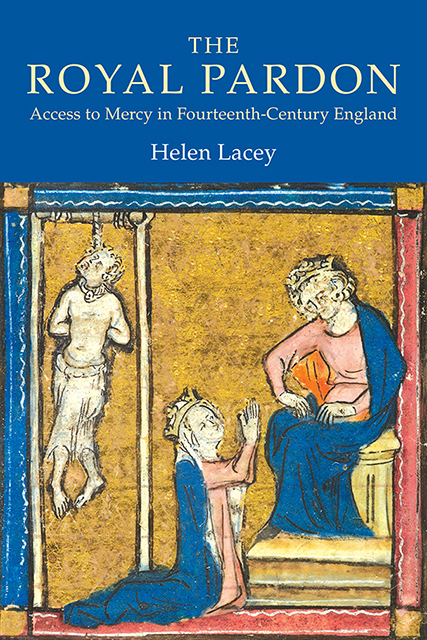Chapter Four - Intercessor
Published online by Cambridge University Press: 07 March 2023
Summary
Those who sought pardon in the later Middle Ages often looked to a patron to intervene on their behalf. Members of the royal family or servants of the Crown might be able to use their influence at court to help to secure a grant of mercy, or at least ensure that the case received attention. For those who were in prison awaiting trial, or for those who had already been outlawed, finding someone to act on their behalf was the only route to pardon. A significant percentage of fourteenth-century pardons issued from Chancery record the name of a person who intervened on behalf of the supplicant. The usual formula was to note that the pardon had been issued ‘at the request of’ a named patron. When lists of these intercessors are compiled (see Appendix 4) it is possible to identify those members of the royal family and extended household who were particularly active in securing grants of mercy. This chapter discusses these prominent patrons, but also examines the role of other ‘middle-men’ involved in the pardoning process. Those individuals who stood surety as ‘mainpernors’ for recipients of pardon, for example, guaranteed their future good conduct and were liable to be fined themselves if the pardoned individual subsequently reoffended. Other people sometimes played a more clandestine role in securing pardons, by bribing intermediaries or even providing forged documents, at the right price.
These less than legitimate practices did not go unnoticed, and the rolls of parliament record discussion on the subject of pardons procured through deceitful means. However, despite the discontent at the potential for corruption, the legislation enacted to address the matter sought to regularise the role of the intercessor for pardon, rather than to outlaw the practice altogether. The role of the intercessor was therefore a somewhat controversial, but widely recognised, part of the process. This chapter examines the ways in which people acted as intermediaries (legitimate or otherwise) in the pardoning process, and their depictions in a variety of different texts.
Patrons
When a pardon was issued from Chancery the clerks tended to note the intercession of a prominent patron if he or she had been instrumental in securing the grant. In 1353 this was made a legal requirement; the name of the patron was to be stated, when relevant, on the letter of pardon itself.
- Type
- Chapter
- Information
- Publisher: Boydell & BrewerPrint publication year: 2009

